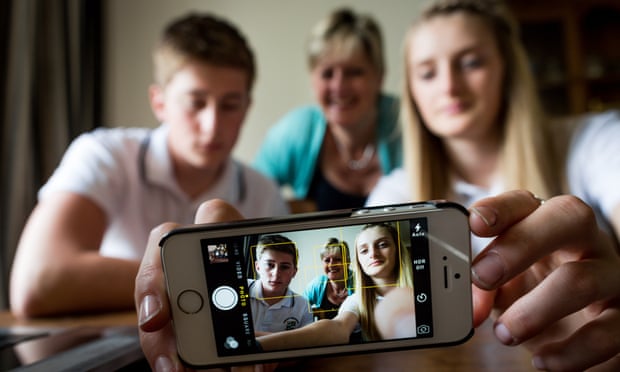Turn off, tune out: National Unplugging Day hopes to give Britain a digital detox
Nationwide initiative for a ‘technology Sabbath’ encourages families to reconnect with each other by disconnecting their computers, iPads and phones for 24 hours

Debbie Bird and her children James, 15, and Charlotte, 13, who are all unplugging their electronic gadgets this weekend for National Unplugging Day. Photograph: Paul Rogers
When the Bird family give up technology on Sunday for the country’s first annual “National Unplugging Day”, 15-year-old James will be most worried about how his sister Charlotte, 13, will cope.
“My sister will struggle more than anyone,” he said. “She relies on her phone so much. She’s always checking it – when we’re on the trampoline together, when we’re talking. She can’t go five minutes without it.”
Debbie Bird says her children are fairly typical when it comes to using technology. She and her husband put restrictions on their children’s screen time, but both teenagers own laptops, iPhones and iPads, have multiple social media accounts and are “fixated” – Charlotte with her phone and James with his PlayStation 4.
“My teenagers are fairly typical teenagers who would prefer to be on their phones or watching YouTube on their iPads than coming out walking with me and the dog,” said Debbie.
Despite this, the Birds are determined to put down the phones and step away from the computer screens for 24 hours and will instead go camping, spending the day walking, swimming and doing archery.
National Unplugging Day, a nationwide initiative by the website My Family Club, encourages families to go on a digital detox for a day and reconnect with each other offline. My Family Club’s founder and chief executive, Gemma Johnson, said she decided to launch the initiative last year after she was contacted by parents looking for advice on how to manage their children’s screen time and digital burnout.
After a successful trial with 1,000 participants in 2014, this year National Unplugging Day has been registered as an official national day and been heavily promoted, primarily – and ironically – online. So far, more than 7,000 people have registered and pledged to go tech-free.
Among them are Gemma Chase, her husband and two daughters, aged six and nine, from Buckinghamshire.
“I think it’s such a brilliant initiative for families like ours who have two impressionable young children about to start the scary world of getting their own phones in a couple of years,” she said.
She said the day is as much about getting parents off their devices and engaging with their kids as it is about loosening the children’s grip on the iPad.
“I’m just really conscious we need to be setting our own example. We’re trying to establish ground rules with the kids now, but in a few years they’ll turn around to us and say ‘Hang on, you’re on Facebook at 7 o’clock, why can’t I be?’”
Chase is so won over by the idea that she thinks she will make unplugging a weekly event. “My husband might struggle, but definitely for me and the children, if we can, we’ll do it every Sunday.”
Dr Richard Graham, consultant psychiatrist specialising in technology addiction at the Nightingale hospital in London says that as the research piles up regarding the mental, social, emotional and physical costs of spending so much time in front of screens, initiatives such as National Unplugging Day are valuable for allowing people to step back and examine their digital habits.
“You don’t really understand the motivations for your connection to devices and the internet until you step away. We need in our culture, through policy or etiquette, to have spaces where you are given permission not to have to stay connected.
“I used to see this with adolescents years ago when [messaging app] BBM was in ascendancy, that they would feel relieved to go on holiday somewhere without a signal – that way it’s not them choosing not to respond to people, it gives them permission to step away.
“In a funny way we need rituals to manage the seductions and responsibilities of technology,” said Graham.
National Unplugging Day is modelled on a US project, the National Day of Unplugging, which was started in 2010 by Reboot, a Jewish cultural group, and encourages people to take a “technology Sabbath”. Both initiatives are part of a larger movement of shutting down and switching off, which has seen restaurants ban mobile phones and national parks offer technology creches, so people can lock up their gadgets and enjoy the surroundings out from behind a screen.
Last month, 1,500 people gathered for the first largescale screen-free music festival. At Innocent Unplugged, held in a forest in Kent, there were no phones, no Wi-Fi and all electricity was solar-powered or kinetic, produced by festival-goers on bicylces and see-saws.
“People loved it. It taps into an ever-increasing lethargy into being plugged in all the time. Everyone wanted to watch good bands without 79 screens in front of them or worrying about what filter on Instagram to use,” said Clemmie Nettlefold, PR manager at Innocent.
Dr Graham says a day without technology can be extremely helpful as a step toward developing healthy technology habits.
“The place we need to get to is one where we can move between offline and digital worlds and we’re in control, rather than bobbing on the ocean of messages and updates that sweep us this way and that.”
No comments:
Post a Comment